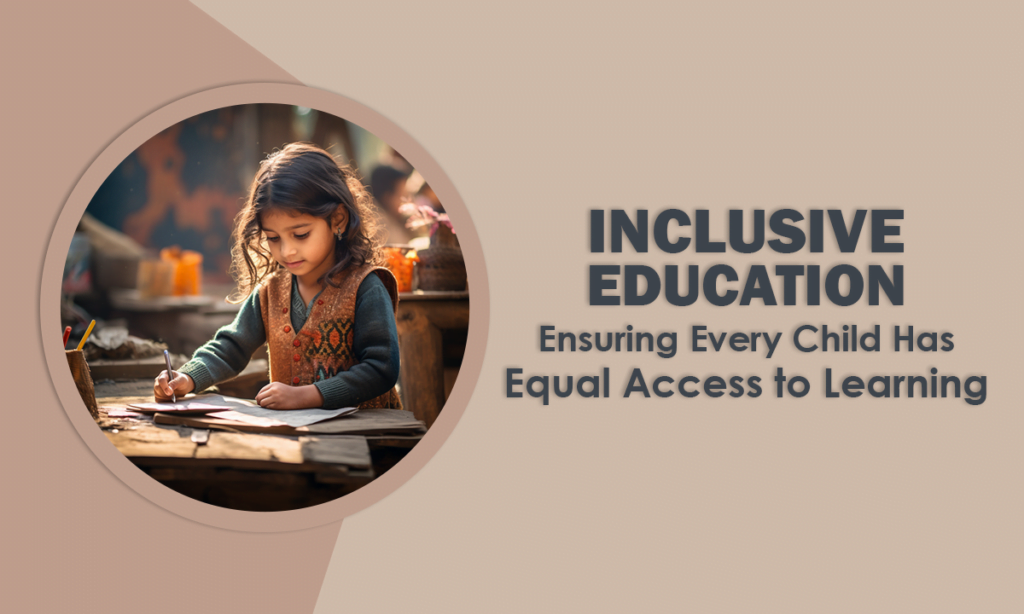Introduction
Education is a fundamental right for every child, serving as the cornerstone for personal growth and social development. In India, with its diverse cultural, linguistic, and socio-economic landscape, the concept of inclusive education is more critical than ever. Inclusive education aims to provide equal opportunities for all children, regardless of their abilities, backgrounds, or differences, fostering a society that celebrates diversity and embraces inclusion.
Understanding Inclusive Education
Inclusive education goes beyond merely integrating children with disabilities into mainstream classrooms; it encompasses an approach that values every child’s unique qualities and recognizes their potential to contribute positively to the learning environment. This educational philosophy aims to remove barriers to learning, promote equitable access, and encourage the active participation of all students in the learning process.
Challenges in the Indian Context
While India has made commendable strides in promoting education for all, numerous challenges persist in achieving truly inclusive education:
Inadequate Infrastructure: Many schools lack the necessary infrastructure and resources to accommodate children with diverse needs. This includes accessible classrooms, ramps, and appropriate learning materials.
Stigma and Discrimination: Society’s prevailing attitudes and misconceptions regarding disabilities and differences can lead to stigmatization and discrimination against children with special needs, hindering their educational opportunities.
Lack of Trained Educators: Inclusive education requires skilled and compassionate educators who can adapt teaching methods to cater to diverse learning styles. Unfortunately, there is a shortage of trained teachers specializing in special needs education.
Socio-economic Disparities: Children from disadvantaged backgrounds face additional challenges due to poverty, lack of access to quality education, and limited support systems.
Language Barriers: India’s linguistic diversity can pose challenges for students from different regions, especially those who face language barriers in the classroom.
Promoting Inclusive Education in India
To achieve inclusive education, concerted efforts are needed from various stakeholders, including the government, educators, parents, and the wider community. Here are some strategies that can be adopted:
Policy Reforms: The Indian government should develop and implement comprehensive policies that prioritize inclusive education. This includes allocating sufficient funds for infrastructure development and training teachers to handle diverse needs.
Teacher Training: Specialized training programs must be initiated to equip teachers with the necessary skills to address the unique needs of diverse learners. This includes understanding disabilities, adapting teaching methodologies, and fostering an inclusive classroom environment.
Awareness Campaigns: Raising awareness about the importance of inclusive education and dispelling myths about disabilities and differences is essential. Public campaigns can help reduce stigma and promote acceptance.
Early Intervention: Identifying and addressing learning difficulties at an early age can significantly improve a child’s educational journey. Early intervention programs should be integrated into the education system.
Collaboration and Partnership: Collaboration among schools, parents, NGOs, and government bodies is crucial for the successful implementation of inclusive education initiatives.
Benefits of Inclusive Education–
Implementing inclusive education practices can yield numerous benefits for both students and society as a whole:
Nurturing Empathy and Tolerance: Inclusive classrooms promote empathy and understanding among students, fostering a culture of acceptance and tolerance.
Improved Academic Performance: Students in inclusive environments tend to perform better academically due to personalized learning approaches and peer support.
Enhanced Social Skills: Inclusive education provides opportunities for children to interact with peers from diverse backgrounds, enhancing their social skills and interpersonal relationships.
Building a Inclusive Society: Inclusive education lays the foundation for an inclusive society that respects diversity and upholds the rights of every individual.
Conclusion
Inclusive education is not just a goal but a moral imperative for India to ensure that every child, irrespective of their abilities or differences, has equal access to quality education. It requires a collective effort from all stakeholders to create a nurturing and inclusive environment where every child can thrive and reach their full potential. By embracing inclusive education, India can foster a generation of empathetic and compassionate individuals who contribute to building a more inclusive and harmonious society for the future.
